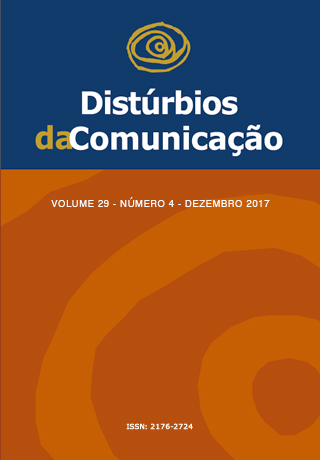Cuidadores informais de sujeitos com afasia: reflexões sobre o impacto no cotidiano
DOI:
https://doi.org/10.23925/2176-2724.2017v29i4p636-643Palavras-chave:
Família, Cuidadores, Lesão cerebral, AfasiaResumo
Introdução: Pessoas com lesões neurológicas adquiridas podem apresentar sequelas motoras e de linguagem que afetam sua vida e a de seus familiares, principalmente quando os últimos assumem a função de cuidadores informais. Objetivo: discutir o impacto das sequelas motoras e afásicas no cotidiano de seus familiares/cuidadores informais. Método: estudo exploratório, transversal, com abordagem qualitativa. Participaram do estudo familiares/cuidadores informais de sujeitos com sequelas motoras e de linguagem, decorrentes de lesões neurológicas que frequentavam o grupo interdisciplinar de convivência. Foram gravados os discursos sobre o impacto dessa situação em seu cotidiano. O tratamento dos dados deu-se a partir da transcrição ortográfica seguida da análise temática/análise de conteúdo. Resultados: O estudo incluiu cinco familiares/cuidadores informais do sexo feminino, do lar (quatro esposas e uma filha), com faixa etária entre 33 e 74 anos. O tempo de cuidado variou de um ano e seis meses a cinco anos. Foram referidas dificuldades na rotina doméstica, vida pessoal e social das cuidadoras assim como nas condições financeiras da família. No caso de os sujeitos apresentarem afasia, obtiveram-se relatos de dificuldades de compreensão e expressão, bem como de lidar com o humor. Conclusão: os resultados evidenciam dificuldades vivenciadas por familiares/cuidadores informais de sujeitos com sequelas motoras e de linguagem, decorrentes de lesão neurológica adquirida e a importância de grupos de convivência com equipe multiprofissional de cuidado inter/transdisciplinar, ampliando as possibilidades de investigações na fonoaudiologia, enquanto área da saúde que estuda a linguagem e as repercussões da afasia na singularidade dos sujeitos acometidos e de seus familiares/cuidadores.
Downloads
Downloads
Publicado
Edição
Seção
Licença
Copyright (c) 2017 Silvana Basso Miolo, Mithielle de Araujo Machado, Fernanda dos Santos Pascotini, Elenir Fedosse

Este trabalho está licenciado sob uma licença Creative Commons Attribution 4.0 International License.









